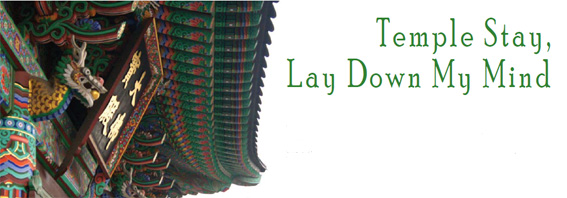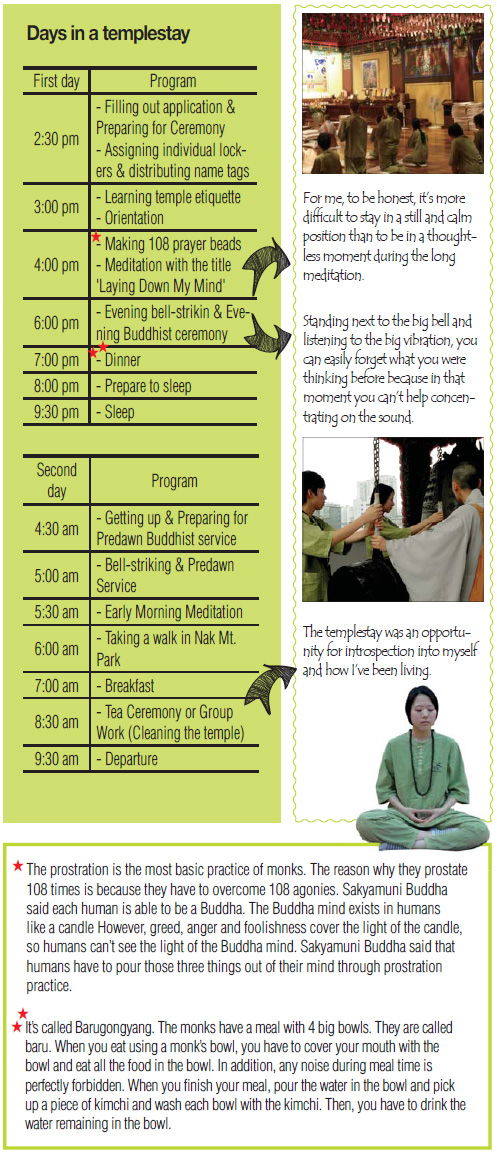
People in a busy modern society want to relax and be comfortable without a repeated routine. Templestays, which have the limelight, are one of the best self-reflecting programs that show this trend. Rest can make modern people’s lives better. CBT reporters this time went to Seoul Nak Mt. Myogak temple and did in-depth coverage of the templestay. -Ed.
■ What is a templestay?
A templestay is when people stay in a Korean traditional temple and experience traditional culture and spirit by practicing asceticism of Korean Buddhism. A templestay also means going through everyday life of the temple. Templestays have developed with contemporary man through much variation and various efforts since 2002. The temples recently have tried to guide ascetics’ lives through templestay programs like Buddhist services, Zen meditation and tea ceremonies, and they have told of the Korean culture of spirit through many programs. Also, there are temples where services are spoken in English for foreigners. Templestays became a cultural experience among not only Koreans but also foreigners.
There are two rules that people have to keep in mind when staying at a temple. These are basic rules. First, people have to speak quietly because temples are holy places where Buddha lives. People have to be decently dressed and can’t come in the temple when they are drunk. They mustn’t smoke in the temple. People must not show their love in the temple such as holding hands or putting arms around each other’s shoulders even if they go to the temple with their sweetheart. Second, people have to put their hands together when they meet Buddhist monks or Buddhists. Putting their hands together symbolizes gathering minds and that they aren’t two but one united with one truth.
■ Vivid experiences
Son Da-seul (Korean Canadian)
Q. What is your purpose for visiting a templestay?
A. The purpose of my visit to this templestay was to spend some quiet time away from the busyness of city life. I’m currently going through transition in my work life (moving countries), so I thought this would be a good way to start fresh.
Q. What are your expectations of this templestay program?
A. I’ve been to a temple in the past and always wanted to try a templestay program. After reading the program on the internet, I knew what to expect. However, I really enjoyed the thorough explanation of Buddhist culture and practices given by the team leader. I hadn’t expected this situation.
Q. What are your thoughts and reflections after the templestay program?
A. I would recommend a templestay for those who are curious and have an interest. It provides the opportunity to engage and enjoy some traditional aspects of Buddhist culture, like inurnment. It also provides great opportunities for reflection for those who seek it.
Lee Yeo-eun (A team leader of Nak Mt. Myogak temple in Seoul)
Q. What do you think is the genuine meaning of a templestay?
A. Many foreingers wanted to experience Korean culture, but there were few Korean traditional cultures that they could experience. Because of a need of Korean traditional culture which anyone can participate in anywhere in the country, a templestay was invented. Templestays were conducted by monks who have been maintaining their lifestyle for 1,700 years. Buddhism started on the Korean Peninsula 1,700 years ago, and the monks have succeeded to pass down Korean tradition for 1,700 years. In other words, the templestay means experiencing the life of Buddhist monks because there are few places except temples that have Korean traditional culture. At most places, people can only just see the buildings of the villages of Korean houses, but, at the temple, people can experience Korean traditional culture that is alive through the monks’ lives from the templestay. Countries in the whole world make an effort to succeed in their traditional culture. In the case of Korea, many treasures and cultural heritages are usually Buddhist. It has been around for 1,700 years, and it will stay. Therefore, templestays are taking the limelight, and I can be sure that they will hold the limelight more.
Q. What is the most impressive experience of a templestay?
A. A father and daughter from Germany participated in a templestay. The father, whose right hand was crushed, was German and the daughter, who had been adopted by him from Korea, was a 21-year-old woman. They visited Myogak temple after not finding her biological parents. During a tea ceremony, a Zen master said, “Other people think that your father’s hand is bad because it was broken. But you can get good health and live a long life due to the hand. After the Korean War, adopting a baby was not a choice but a problem with deciding whether the baby can survive or die. Please understand your biological parents and don’t blame them.” The father and daughter wrote a letter that thanked him for making them comfortable after the templestay.]

By Kim Ji-won | jw34@cbnu.ac.kr
By Park Ji-su | js34@cbnu.ac.kr


 All
All Culture
Culture






 Kim Ji-won & By Park Ji-su
Kim Ji-won & By Park Ji-su











